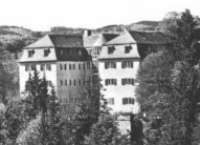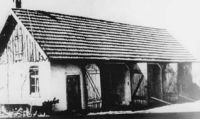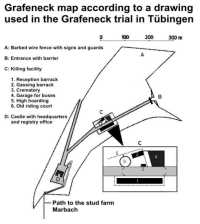 |
| Grafeneck Castle |
The former medieval castle Grafeneck was built on a hill near
Marbach.
On
24 May 1939, members of
Aktion T4 visited the buildings in order to
find out if it could be used for their killing programme. On
14 October
Grafeneck Castle was duly confiscated. Between 10 and 15 manual labourers from nearby villages started to
convert the castle into a
killing centre.
 |
| Gas Chamber |
300 m away from the castle several barracks were built, fenced
in with a hoarding up to 4 m high. On the first floor of the
castle the following facilities were installed: accomodations and
offices for the doctors, a registry office, a police office, the
office for the comfort letters and others. On the second floor,
small living- and sleeping rooms for the personnel were installed.
The main building of the killing facility was a barrack (68 m
long and 7 m wide), which included several rooms. In one of
them 100 beds were placed, covered with straw-bags. Three big buses
for transportation of the victims and an ambulance car stood in a
wooden garage. Two mobile cremation ovens were located in another
wooden barrack. Because of the immense heat, generated by the
round-the-clock cremation, the roof of the barrack was removed and
after a short time the surrounding trees even blackened. The gas chamber,
resembling a shower bath, could hold 75 persons.
A former horse stable (round, and 15 m in diameter) probably
served as storage room for the corpses. At the bottom of the hill,
at the access road, a high hoarding and a guardhouse were built.
Fences with barbed wire surrounded the whole castle whilst armed
guards with dogs patrolled these perimeters.
 |
| Map |
In
mid-November 1939, SS men, typists and other personnel arrived
and were supplemented during
early January 1940 by approximately 25
nurses, some being male. In
mid-January the cremation ovens were
delivered. On
18 January 1940 the first transport of 25 handicapped
men arrived from
Eglfing-Haar near
Munich, managed by the Grafeneck chief
Dr
Horst Schumann. He joined T4 since
early October 1939, after a meeting with
Viktor Brack in
Hitler's
chancellery. In
early summer of 1940 he was ordered to the
Sonnenstein euthanasia centre. Successors in Grafeneck:
Dr
Ernst Baumhardt and finally Dr
Günther Hennecke.
Chief of administration became
Christian Wirth, a detective superintendent
and
SS-Obersturmführer. He supervised the first gassings. Later
he became inspector of all
Aktion Reinhard extermination camps.
The killing continued until
13 December 1940. Then Grafeneck was no
longer part of the euthanasia programme because, according to the plan,
all handicapped persons from the Grafeneck operational area had been killed.
Some of the personnel went on holiday while some were ordered to the
Hadamar euthanasia centre. A few remained at the castle to cover up all
tracks of the actions that happened there.
10,824 victims were gassed and cremated at this facility.
© ARC 2005













